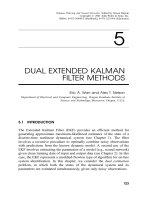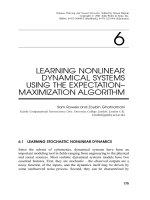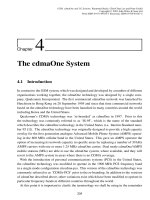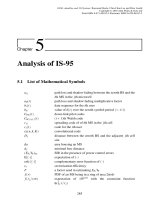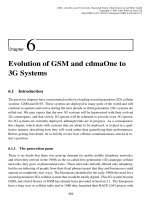Environment and Globalization Five Propositions pdf
Bạn đang xem bản rút gọn của tài liệu. Xem và tải ngay bản đầy đủ của tài liệu tại đây (529.14 KB, 54 trang )
Environment and Globalization
Five Propositions
Adil Najam, David Runnalls and Mark Halle
Globalizationcov.qx 1/23/07 2:02 PM Page 2
Environment
and
Globalization
Five Propositions
Adil Najam, David Runnalls and Mark Halle
This work is a product of the “Environment and Governance Project”
of the International Institute for Sustainable Development. This research
was conducted independently by IISD with financial support from
the Ministry of Foreign Affairs, Government of Denmark.
Globalization.qx 1/24/07 11:05 AM Page i
© 2007, International Institute for Sustainable Development
The International Institute for Sustainable Development contributes
to sustainable development by advancing policy recommendations
on international trade and investment, economic policy, climate
change and energy, measurement and assessment, and sustainable
natural resources management. Through the Internet, we report on
international negotiations and share knowledge gained through
collaborative projects with global partners, resulting in more rigor-
ous research, capacity building in developing countries and better
dialogue between North and South.
IISD’s vision is better living for all—sustainably; its mission is to
champion innovation, enabling societies to live sustainably. IISD is
registered as a charitable organization in Canada and has 501(c)(3)
status in the United States. IISD receives core operating support
from the Government of Canada, provided through the Canadian
International Development Agency (CIDA), the International
Development Research Centre (IDRC) and Environment Canada;
and from the Province of Manitoba. The Institute receives project
funding from numerous governments inside and outside Canada,
United Nations agencies, foundations and the private sector.
International Institute for Sustainable Development
161 Portage Avenue East, 6th Floor
Winnipeg, Manitoba
Canada R3B 0Y4
Te l.: +1 (204) 958-7700
Fax: +1 (204) 958-7710
We b site:
Environment and Globalization: Five Propositions is available online
in IISD’s Publications Centre at />Designed by Donald Berg. Cover photo from iStock. Printed by
Unigraphics Ltd., Winnipeg, Manitoba, Canada.
This work was funded through a grant from the Danish Ministry
of Foreign Affairs.
Cover printed on paper with 50% recycled fibre; 25% post-consumer waste.
Te xt printed on 100% post-consumer recycled paper.
Globalization.qx 1/24/07 11:05 AM Page ii
Ta ble of Contents
Introduction 1
Environment and Globalization: Understanding the Linkages 4
The Five Propositions 10
Avenues for Action: What Can We Do? 29
Endnotes 36
Bibliography 39
Environment and Globalization: Five Propositions
iii
Globalization.qx 1/24/07 11:05 AM Page iii
Environment and Globalization: Five Propositions
iv
Globalization.qx 1/24/07 11:05 AM Page iv
Introduction
The processes that we now think of as “globalization” were central
to the environmental cause well before the term “globalization”
came into its current usage. Global environmental concerns were
born out of the recognition that ecological processes do not always
respect national boundaries and that environmental problems often
have impacts beyond borders; sometimes globally. Connected to
this was the notion that the ability of humans to act and think at a
global scale also brings with it a new dimension of global responsi-
bility—not only to planetary resources but also to planetary fair-
ness. These ideas were central to the defining discourse of con-
temporary environmentalism in the 1960s and 1970s
1
and to the
concept of sustainable development that took root in the 1980s and
1990s.
2
The current debate on globalization has become de-linked from its
environmental roots and contexts. These links between environ-
ment and globalization need to be re-examined and recognized. To
ignore these links is to misunderstand the full extent and nature of
globalization and to miss out on critical opportunities to address
some of the most pressing environmental challenges faced by
humanity. The purpose of this paper is to explore these linkages in
the context of the current discourse.
For its February 2007 meetings, the Global Ministerial
Environment Forum (GMEF) of the United Nations Environment
Programme (UNEP) has selected environment and globalization as
one of its areas of focus. This paper has been prepared as an inde-
pendent input to that process. The thrust of the paper, therefore, is
on policy-relevant debates and its principal audience is environ-
mental leaders assembling in Nairobi, Kenya, for the GMEF meet-
ings. However, the paper aspires also to be relevant to audiences and
debates beyond this meeting. We hope that the paper will inspire
discussions—even if they are critical of our analysis—on the nature
and importance of the links between environment and globaliza-
tion. It is hoped that the discussions that will begin in Nairobi will
Environment and Globalization: Five Propositions
1
Globalization.qx 1/24/07 11:05 AM Page 1
not end there—that these conversations will not only be carried
back to national capitals, but will also be carried forward by leaders
of government, international organizations, civil society and busi-
ness. We hope that this paper will contribute to a more vigorous
conversation on environment and globalization at Nairobi, and
beyond.
This paper has been produced independently by the International
Institute for Sustainable Development (IISD) with financial sup-
port from the Ministry of Foreign Affairs, Government of
Denmark. The process was led by David Runnalls (IISD’s President
and Chief Executive Officer) and Mark Halle (IISD’s Director of
Tr ade and Investment and European Representative). The principal
author is Prof. Adil Najam (IISD Associate and Associate Professor
at the Fletcher School of Law and Diplomacy, Tufts University),
who was assisted in the research by Mihaela Papa and Lauren K.
Inouye.
3
The paper has benefited tremendously from the insights and ideas
of an ad hoc advisory group that met twice in Geneva (October
2006 and January 2007). These meetings were attended by the
authors and researchers as well as by Hussein Abaza (Egypt), Tariq
Banuri (Pakistan), Susan Brown (Australia), Tom Burke (United
Kingdom), Kim Carstensen (Denmark), Marion Cheatle (United
Kingdom), Dharam Ghai (Kenya), Jean-Pierre Lehmann (France),
Kilaparti Ramakrishna (India/United States), Phillipe Roch
(Switzerland), Laurence Tubiana (France) and Dominic Waughray
(United Kingdom), all of whom inspired and shaped the ideas con-
tained here in countless ways. In addition, this paper has also bene-
fited from the advice and encouragement of Achim Steiner,
Executive Director of UNEP. We are also grateful to Aaron Cosbey
of IISD for providing very useful comments on the final draft. We
are especially grateful to Mihaela Papa and Lauren K. Inouye of the
Fletcher School of Law and Diplomacy, Tufts University, for their
invaluable research assistance, and for their substantive and signifi-
cant contributions to the ideas contained here. The paper remains
a totally independent publication, and the views expressed here do
not necessarily represent the official position of either the
Government of Denmark or of UNEP.
Environment and Globalization: Five Propositions
2
Globalization.qx 1/24/07 11:05 AM Page 2
The paper is divided into three sections. Following the introduc-
tion, we outline the nature of the linkages between environment
and globalization, especially highlighting the fact that these are two-
way linkages: not only can the processes of globalization impact the
environment, but the dynamics of the environment can also impact
and shape the nature of globalization. The next section, which is the
bulk of the paper, begins exploring these linkages through the lens
of five “propositions” that seek to highlight those elements that are
particularly prescient for policy-making and policy-makers. The
propositions do not seek to cover every aspect of the environment
and globalization problematique. They are, instead, designed to
highlight specific aspects of the relationship that are of particular
salience in realizing key environment and globalization goals. The
last section posits a set of suggested avenues for action on environ-
ment and globalization. This section is organized around the notion
that better global governance is the key to managing both global-
ization and the global environment.
Environment and Globalization: Five Propositions
3
Globalization.qx 1/24/07 11:05 AM Page 3
Environment and
Globalization: Understanding
the Linkages
Although the contemporary debate on globalization has been con-
tentious, it has not always been useful. No one doubts that some
very significant global processes—economic, social, cultural, politi-
cal and environmental—are underway and that they affect (nearly)
everyone and (nearly) everything. Yet, there is no agreement on
exactly how to define this thing we call “globalization,” nor on
exactly which parts of it are good or bad, and for whom. For the
most part, a polarized view of globalization, its potential and its
pitfalls has taken hold of the public imagination. It has often been
projected either as a panacea for all the ills of the world or as their
primary cause. The discussion on the links between environment
and globalization has been similarly stuck in a quagmire of many
unjustified expectations and fears about the connections between
these two domains.
Box 1. Defining globalization.
What is Globalization?
There are nearly as many definitions of globalization as
authors who write on the subject. One review, by Scholte, pro-
vides a classification of at least five broad sets of definitions:
4
Globalization as internationalization. The “global” in global-
ization is viewed “as simply another adjective to describe
cross-border relations between countries.” It describes the
growth in international exchange and interdependence.
Globalization as liberalization. Removing government-
imposed restrictions on movements between countries.
Globalization as universalization. Process of spreading ideas
and experiences to people at all corners of the earth so that
Environment and Globalization: Five Propositions
4
Globalization.qx 1/24/07 11:05 AM Page 4
aspirations and experiences around the world become harmo-
nized.
Globalization as westernization or modernization. The social
structures of modernity (capitalism, industrialism, etc.) are
spread the world over, destroying cultures and local self-deter-
mination in the process.
Globalization as deterritorialization. Process of the “recon-
figuration of geography, so that social space is no longer wholly
mapped in terms of territorial places, territorial distances and
territorial borders.”
Although the debates on the definition and importance of global-
ization have been vigorous over time, we believe that the truly rele-
vant policy questions today are about who benefits and who does
not; how the benefits and the costs of these processes can be shared
fairly; how the opportunities can be maximized by all; and how the
risks can be minimized.
In addressing these questions, one can understand globalization to
be a complex set of dynamics offering many opportunities to better
the human condition, but also involving significant potential
threats. Contemporary globalization manifests itself in various
ways, three of which are of particular relevance to policy-makers.
They also comprise significant environmental opportunities and
risks.
1. Globalization of the economy. The world economy globalizes
as national economies integrate into the international economy
through trade; foreign direct investment; short-term capital
flows; international movement of workers and people in general;
and flows of technology.
5
This has created new opportunities
for many; but not for all. It has also placed pressures on the
global environment and on natural resources, straining the
capacity of the environment to sustain itself and exposing
human dependence on our environment.
6
A globalized economy
can also produce globalized externalities and enhance global
inequities.
7
Local environmental and economic decisions can
Environment and Globalization: Five Propositions
5
Globalization.qx 1/24/07 11:05 AM Page 5
contribute to global solutions and prosperity, but the environ-
mental costs, as well as the economic ramifications of our
actions, can be externalized to places and people who are so far
away as to seem invisible.
2. Globalization of knowledge. As economies open up, more
people become involved in the processes of knowledge integra-
tion and the deepening of non-market connections, including
flows of information, culture, ideology and technology.
8
New
technologies can solve old problems, but they can also create
new ones. Technologies of environmental care can move across
boundaries quicker, but so can technologies of environmental
extraction. Information flows can connect workers and citizens
across boundaries and oceans (e.g., the
rise of global social movements as well
as of outsourcing), but they can also
threaten social and economic networks
at the local level. Environmentalism as a
norm has become truly global, but so
has mass consumerism.
3. Globalization of governance. Globalization places great stress
on existing patterns of global governance with the shrinking of
both time and space; the expanding role of non-state actors;
and the increasingly complex inter-state interactions.
9
The
global nature of the environment demands global environmen-
tal governance, and indeed a worldwide infrastructure of inter-
national agreements and institutions has emerged and continues
to grow.
10
But many of today’s global environmental problems
have outgrown the governance systems designed to solve
them.
11
Many of these institutions, however, struggle as they
have to respond to an ever-increasing set of global challenges
while remaining constrained by institutional design principles
inherited from an earlier, more state-centric world.
The relationship between the environment and globalization—
although often overlooked—is critical to both domains.
12
The envi-
ronment itself is inherently global, with life-sustaining ecosystems
and watersheds frequently crossing national boundaries; air pollu-
tion moving across entire continents and oceans; and a single
Environment and Globalization: Five Propositions
6
Environmentalism as a
norm has become truly
global, but so has mass
consumerism.
Globalization.qx 1/24/07 11:05 AM Page 6
shared atmosphere providing climate protection and shielding us
from harsh UV rays. Monitoring and responding to environmental
issues frequently provokes a need for coordinated global or regional
governance. Moreover, the environment is intrinsically linked to
economic development, providing natural resources that fuel
growth and ecosystem services that underpin both life and liveli-
hoods. Indeed, at least one author suggests that “the economy is a
wholly-owned subsidiary of the ecology.”
13
While the importance of the relationship between globalization and
the environment is obvious, our understanding of how these twin
dynamics interact remains weak. Much of the literature on global-
ization and the environment is vague (discussing generalities);
myopic (focused disproportionately only on trade-related connec-
tions); and/or partial (highlighting the impacts of globalization on
the environment, but not the other way around).
It is important to highlight that not only does globalization impact
the environment, but the environment impacts the pace, direction
and quality of globalization. At the very least, this happens because
environmental resources provide the fuel for economic globaliza-
tion, but also because our social and policy responses to global envi-
ronmental challenges constrain and influence the context in which
globalization happens. This happens, for example, through the gov-
ernance structures we establish and through the constellation of
stakeholders and stakeholder interests
that construct key policy debates. It
also happens through the transfer of
social norms, aspirations and ideas
that criss-cross the globe to formulate
extant and emergent social move-
ments, including global environmen-
talism.
In short, not only are the environment
and globalization intrinsically linked,
they are so deeply welded together
that we simply cannot address the
global environmental challenges facing us unless we are able to
understand and harness the dynamics of globalization that influ-
Environment and Globalization: Five Propositions
7
They are so deeply
welded together that
we simply cannot address
the global environmental
challenges facing us
unless we are able to
understand and
harness the dynamics of
globalization that
influence them.
Globalization.qx 1/24/07 11:05 AM Page 7
ence them. By the same token, those who wish to capitalize on the
potential of globalization will not be able to do so unless they are
able to understand and address the great environmental challenges
of our time, which are part of the context within which globaliza-
tion takes place.
Table 1. Environment and globalization: some examples of interaction.
How does globalization Means of How does environment
affect the environment? influence affect globalization?
Environment and Globalization: Five Propositions
8
- Scale and composition of
economic activity changes,
and consumption increases,
allowing for more widely
dispersed externalities.
- Income increases, creating
more resources for environ-
mental protection.
- Techniques change as tech-
nologies are able to extract
more from nature but can
also become cleaner.
Economy - Natural resource scarcity
or/and abundance are driv-
ers of globalization, as they
incite supply and demand
forces in global markets.
- The need for environmen-
tal amelioration can extract
costs from economy and
siphon resources away
from development goals.
- Global interactions facilitate
exchange of environmental
knowledge and best practices.
- Environmental consciousness
increases with emergence of
global environmental net-
works and civil society
movements.
- Globalization facilitates the
spread of existing technolo-
gies and the emergence of
new technologies, often
replacing existing technolo-
gies with more extractive
alternatives; greener tech-
nologies may also be
spurred.
- Globalization helps spread a
homogenization of con-
sumption-driven aspirations.
Knowledge - Signals of environmental
stress travel fast in a com-
pressed world, environ-
mentally degraded and
unsustainable locations
become marginalized from
trade, investment, etc.
- Sensibilities born out of
environmental stress can
push towards localization
and non-consumptive devel-
opment in retaliation to the
thrust of globalization.
- Environmental stress can
trigger alternative techno-
logical paths, e.g., demate-
rialization, alternative
energy, etc., which may not
have otherwise emerged.
- Environmentalism
becomes a global norm.
Globalization.qx 1/24/07 11:05 AM Page 8
How does globalization Means of How does environment
affect the environment? influence affect globalization?
The dominant discourse on globalization has tended to highlight
the promise of economic opportunity. On the other hand, there is a
parallel global discourse on environmental responsibility. A more
nuanced understanding needs to be developed—one that seeks to
actualize the global opportunities offered by globalization while ful-
filling global ecological responsibilities and advancing equity. Such
an understanding would, in fact, make sustainable development a
goal of globalization, rather than a victim. As a contribution
towards this more nuanced understanding of these two dynamics,
we will now outline five propositions related to how environment
and globalization are linked and how they are likely to interact.
Environment and Globalization: Five Propositions
9
- Globalization makes it
increasingly difficult for states
to rely only on national regu-
lation to ensure the well-
being of their citizens and
their environment.
- There is a growing demand and
need for global regulation, espe-
cially for the means to enforce
existing agreements and build
upon their synergies to
improve environmental per-
formance.
- Globalization facilitates the
involvement of a growing
diversity of participants and
their coalitions in addressing
environmental threats,
including market and civil
society actors.
Governance - Environmental standards
influence patterns of trade
and investment nationally
and internationally.
- The nature of environ-
mental challenges requires
the incorporation of envi-
ronmental governance
into other areas (e.g.,
trade, investment, health,
labour, etc.).
- Stakeholder participation
in global environmental
governance—especially the
participation of NGOs and
civil society—has become
a model for other areas of
global governance.
Globalization.qx 1/24/07 11:05 AM Page 9
The Five Propositions
By way of exploring the linkages between environment and global-
ization, let us posit five key propositions on how these two areas are
linked, with a special focus on those linkages that are particularly
pertinent for policy-making and policy-makers. The purpose of these
propositions is to highlight the possible implications of the domi-
nant trends. This is neither an exhaustive list nor a set of predic-
tions. It is rather an identification of the five important trajectories
which are of particular importance to policy-makers because (a)
these are areas that have a direct bearing on national and interna-
tional policy and, (b) importantly, they can be influenced by national
and international policy.
PROPOSITION
#1:
T
he rapid acceleration in global economic activity
and our dramatically increased demands for criti-
cal, finite natural resources undermine our pursuit of
continued economic prosperity.
The premise of this proposition is that a sound environment is
essential to realizing the full potential of globalization. Conversely,
the absence of a sound environment can significantly undermine
the promise of economic prosperity through globalization.
The notion that rising pressures on, and dwindling stocks of, critical
natural resources can dramatically restrain the motors of economic
growth is not new.
14
What is new, however, is the realization that the
spectacular economic expansion we have been seeing has made the
resource crunch a pressing reality that could easily become the single
biggest challenge to continued economic prosperity.
The premise of the proposition is fairly simple. First, natural
resources—oil, timber, metals, etc.—are the raw materials behind
much of global economic growth. Second, there is ultimately a finite
Environment and Globalization: Five Propositions
10
Globalization.qx 1/24/07 11:05 AM Page 10
amount of these resources available for human use. Third, and
importantly, the quantum of resources being used has grown expo-
nentially in recent years, especially with the spectacular economic
expansion of large developing economies—such as India and
China—and increasing global prosperity. Fourth, we are already
witnessing increasing global competition for such resources; and
not just market, but geopolitical forces are being mobilized to
ensure continued supplies and controls over critical resources.
15
Add these facts together and you arrive at a realization that sooner
rather than later the degradation of ecological processes—especially
fragile ecological systems that are central to the preservation of our
essential life systems—could cause a major hiccup in continued
global economic growth, and possibly become the single most
important threat to the continuation of current globalization tra-
jectories.
16
The dynamic is not new, but it has suddenly become
more real and more immediate. Growth, of course, is a paradox in
the context of sustainable development.
17
We need growth in order
to meet the needs of people, especially the poorest among us; but
permanent global growth is impossible in a finite system. Studies
demonstrate that we already exceed the productive capacity of
nature by 25
18
to 30 per cent,
19
and that 60 per cent
20
of the ecosys-
tems are currently overused.
Although scares about “limits to growth”
21
have proved less than
credible in the past, simple economic logic (and available trends)
argues that, as competition for scarce natural resources increases,
prices will be driven up—and sooner than we might have assumed.
In the past, technology has—and in the future, it certainly could—
help to alleviate some of these pressures by developing new solu-
tions and by more widely deploying existing technological solu-
tions. However, the prospects of higher demand, growing prices and
dwindling stocks are already propelling new races for control over
key resources. The race is now on not just for oil, but for metals,
minerals, timber and even for recyclable waste.
22
For many devel-
oping countries endowed with critical resources in high demand,
this provides an opportunity to harness the power of globalization
and pull themselves out of poverty. Past experience suggests that
national and global economies have not been particularly good at
Environment and Globalization: Five Propositions
11
Globalization.qx 1/24/07 11:05 AM Page 11
allowing for the benefits of resources to flow down to the poor;
23
the challenge today is to find the ways and means to do exactly that.
A parallel challenge is to decrease the adverse effects of resource
competition on the poor.
24
For example,“fish prices are expected to
rise, reducing the availability and affordability of fish for low-
income families in developing countries.”
25
In areas like the
Mekong River basin in Southeast Asia, where 50 million people
depend on fish for their food and their livelihoods,
26
poor families
will lose food security while the wealthy, both domestically and
globally, bid up the price of food the poor cannot afford.
Populations dependent on the extraction or exploitation of natural
resources, or on natural systems and ecosystem services, could lose
their livelihoods as local sources are depleted (fisheries, forests, etc.)
or degraded (soil fertility for agriculture) and will need assistance to
make the transition to alternative employment.
While market mechanisms and technology could possibly assist in
handling increasing resource competition, they offer no solutions
for running out of ecosystem services.
27
This is a critical threat to
the continuation of current globalization trajectories and the
preservation of our lives on the planet. Many critical ecosystem
services—including watershed filtration, soil fertility and climate
stability—are un-valued (or under-valued) and, therefore, as these
ecological services are threatened, there are no market signals that
would spur technological development of alternative supplies. More
importantly, we do not have the technological ability to create sub-
stitutes for ecological services at the volume or at the costs that
would be needed.
Environmental degradation could also impact productivity through
damages to health. For example, international agencies found that
2.5 million people in the Asia-Pacific
region die every year due to environ-
mental problems including air pollu-
tion, unsafe water and poor sanita-
tion.
28
Ignoring environmental costs
destroys value. The “natural capital” of
ecosystem services (such as watersheds, which provide clean water)
is drawn down, creating a need to pay for services (like water filtra-
Environment and Globalization: Five Propositions
12
Ignoring environmental
costs destroys value.
Globalization.qx 1/24/07 11:05 AM Page 12
tion plants) that could have been provided for free, in perpetuity, if
sustainably managed.
29
Similarly, environmental degradation, global
and local, will affect the agricultural sector, on which the majority of
the world’s poor depend directly for their survival. For example,
recent data suggest that global climate change could reduce South
Asia’s wheat area by half.
30
While gains in productivity in temperate
areas could partially offset the difference, whether poorer tropical
countries could afford to buy food from richer regions of the world
is uncertain. To avoid famine, the Consultative Group on
International Agricultural Research has already called for accelerated
efforts to develop drought-, heat- and flood-resistant strains of sta-
ple crops.
31
The Worldwatch Institute estimates that 17 per cent of
cropland in China, and a staggering 28 per cent in India, is seriously
degraded by erosion, water-logging, desertification and other forms
of degradation.
32
It is most likely, therefore, that
decreased environmental stability
will create more hostile conditions
for economic growth and also
place new pressures on interna-
tional cooperation. Two recent
reports have documented and
drawn global attention to this dis-
cussed “possibility,” which has
started to become a reality. On one hand, the Millennium Ecosystem
Assessment
33
has meticulously documented the slide in the environ-
mental health of the planet and how we are pushing the limits of
many critical resources. The recent rise in oil prices has had the effect
of making this connection tangible and recognizable even to ordi-
nary citizens. On the other hand, the recently released Stern Review
34
has bluntly suggested that these environmental pressures have now
begun impacting global economic processes and that impacts of cli-
mate change could create losses of 5–10 per cent of global GDP, and
decrease welfare by up to 20 per cent if damages include non-market
impacts and are weighted for ethical/distribution effects. This calcu-
lation includes estimations of damages caused by flooding, lower
crop yields, extreme weather-related damages, and other direct
impacts on the environment and human health.
Environment and Globalization: Five Propositions
13
It is most likely, therefore,
that decreased environmental
stability will create more
hostile conditions for
economic growth and also
place new pressures on
international cooperation.
Globalization.qx 1/24/07 11:05 AM Page 13
Together, and in the context of galloping economic growth in Asia
and elsewhere, these and other such findings suggest that mounting
environmental degradation could impose very significant costs on
globalization and economic growth. But they also hold the promise
that an improved environment is central to human well-being in
ecological as well as in economic terms.
PROPOSITION #2:
T
he linked processes of globalization and environ-
mental degradation pose new security threats to an
already insecure world. They impact the vulnerability
of ecosystems and societies, and the least resilient
ecosystems. The livelihoods of the poorest communities
are most at risk.
With globalization, when insecurity increases and violence erupts,
the ramifications become global in reach. The forces of globaliza-
tion, when coupled with those of environmental degradation,
expand concepts of threat and security, both individually and
through their connections. We have already begun recognizing new
global threats from non-state groups and individuals, and security
is now being defined more broadly to include, among other, wars
between and within states; transnational organized crime; internal
displacements and migration; nuclear and other weapons; poverty;
infectious disease; and environmental degradation.
35
To take one pressing example, the World Resources Institute (WRI)
reports that:
36
Water scarcity is already a major problem for the world’s poor,
and changes in rainfall and temperature associated with climate
change will likely make this worse. Even without climate
change, the number of people affected by water scarcity is pro-
jected to increase from 1.7 billion today to 5 billion by 2025.
37
In addition, crop yields are expected to decline in most tropical
and sub-tropical regions as rainfall and temperature patterns
change with a changing climate.
38
A recent report by the Food
Environment and Globalization: Five Propositions
14
Globalization.qx 1/24/07 11:05 AM Page 14
and Agriculture Organization estimates that developing nations
may experience an 11 per cent decrease in lands suitable for
rain-fed agriculture by 2080 due to climate change.
39
There is
also some evidence that disease vectors such as malaria-bearing
mosquitoes will spread more widely.
40
At the same time, global
warming may bring an increase in severe weather events like
cyclones and torrential rains.
All of this imperils human security, which in turn drives societal
insecurity and, in many cases, violence. Placed in the context of
globalization, violence and insecurity can spill out since now they
can travel further, just as people, goods and services can.
Security is about protecting people from critical and pervasive
threats.
41
This ranges from the security of nations to that of indi-
viduals and of societies. Human security is about creating systems
that give individuals and communities the building blocks to live
with dignity. Livelihoods are, therefore, an essential element of
human security. Acting together, globalization and environmental
stress may directly threaten the livelihoods of the poor, i.e., the
capabilities, material and social assets and activities required for a
means of living, and decrease their ability to cope with, and recover
from, environmental stresses and shocks.
For “winners” of the process, glob-
alization becomes an integrating
phenomenon—one that brings
together markets, ideas, individu-
als, goods, services and communi-
cations. For the “losers” in the
process, however, it can be a mar-
ginalizing phenomenon.
42
Just as
the winners come closer to each
other they become more “distant”
from the losers. The dependence
within society on each other
becomes diminished as trans-
boundary dependence increases. To use a basic example, as West
African consumers develop a liking for imported rice, their “links”
to farmers on other continents who export rice to them increase
Environment and Globalization: Five Propositions
15
For “winners” of the process,
globalization becomes an
integrating phenomenon—
one that brings together mar-
kets, ideas, individuals,
goods, services and commu-
nications. For the “losers” in
the process, however, it can
be a marginalizing
phenomenon.
Globalization.qx 1/24/07 11:05 AM Page 15
even as their “links” to farmers in their own country growing cassa-
va decrease. Environmental stress can have a similarly marginalizing
impact on the vulnerable and the weak. It is quite clear from the evi-
dence now that even though climate change will eventually impact
everyone, it will impact the poorest
communities first and hardest. In the
case of desertification, we already see
the poorest and most vulnerable com-
munities being displaced the most.
43
In essence, the already insecure and
vulnerable are pushed to greater
depths of insecurity and vulnerability.
The combined effects of globalization-related marginalization and
environment-related marginalization can wreak havoc on whatever
resilience poor communities might otherwise have possessed. An
illustrative example is the case of small fishers in the Caribbean.
44
On one hand, globalization forces of advanced extraction technolo-
gies, reduced transportation costs, increased ability to keep fish-
stock fresh over long distances and increasing global demands from
far-away markets combine to drive the small fisher out of the mar-
ket. On the other, the very same forces dramatically decrease the
amount of fish in the ocean, thereby further reducing the resilience
of the small fisher. As globalization changes the patterns of envi-
ronmental dependence, it may marginalize parts of Caribbean soci-
ety and disintegrate local security networks.
In many ways, climate change is the ultimate threat to global secu-
rity because it can existentially threaten security at every level from
the individual to the planetary.
45
In a world where one-quarter of
the people in developing countries (1.3 billion) already survive on
fragile lands,
46
and where approximately 60 per cent of ecosystem
services examined are being degraded or used unsustainably,
including freshwater; capture fisheries; air and water purification;
and climate regulation,
47
the implications of global climate change
are becoming evident among the already vulnerable. For example,
impacts of climate change on Inuit livelihoods have been recorded;
evacuations of low-lying coastal populations, such as Vanuatu’s,
have begun; and more dramatic adaptation and survival challenges
Environment and Globalization: Five Propositions
16
… the already insecure
and vulnerable are
pushed to greater depths
of insecurity and
vulnerability.
Globalization.qx 1/24/07 11:05 AM Page 16
in vulnerable states such as Bangladesh are expected. Climate
change-related sea level rise and agricultural disruption could cause
150 million environmental refugees in the year 2050 which could
exacerbate insecurity in host countries and regionally.
48
The death
of low-lying coastal states and changes in their economic zones and
maritime boundaries may cause further instability.
Three key security challenges in the context of climate change are
water scarcity, food shortages and disrupted access to strategic min-
erals such as oil. Historically, these have been the cause of violence
and war. International experience with the linkage between natural
resources and conflict calls for resolute action as natural resources
can fuel and motivate violent conflict (e.g., conflict diamonds fund-
ing rebel groups in Angola and Sierra Leone; conflicts over distribu-
tion of resource profits from timber and natural gas in Indonesia; oil
as key factor in Iraqi invasion of Kuwait).
49
Environmental stress
unleashed by potential climate change could trigger international
migration and, possibly, civil wars. In fragile circumstances, environ-
mental stress could act as an additional destabilizing factor exacer-
bating conflict as it combines with other political and social factors.
Conditions of insecurity and conflict
impose high costs on the pursuit of
sustainable development just as they
impose hurdles in the way of global-
ization.
50
Both processes require a
measure of stability without which
only survival considerations will be
pursued. Conflict sets back the
prospects for sustainable develop-
ment, often by decades, by setting in
motion a negative spiral—environmental degradation leads to more
competition for scarce resources, leading the powerful to secure the
resources for their use, leading to conflict, which leads to worsened
social relations, smash-and-grab resource use, greater resentment,
etc. Security—from national to human—is, therefore, a prerequisite
for realizing the benefits of sustainable development as well as those
of globalization.
Environment and Globalization: Five Propositions
17
Conditions of insecurity
and conflict impose high
costs on the pursuit of
sustainable development
just as they impose hurdles
in the way of globalization.
Globalization.qx 1/24/07 11:05 AM Page 17
PROPOSITION #3:
T
he newly prosperous and the established wealthy
will have to come to terms with the limitations of
the ecological space in which both must operate, and
also with the needs and rights of those who have not
been as lucky.
Consider the following:
• Emerging economies now dominate and drive global growth.
51
Last year their combined output accounted for more than half
of total world GDP.
•China has become a major importer of just about all natural
resources. It is now also the world’s largest importer of recycla-
ble waste material.
52
•“About 700,000 Chinese tourists visited France last year and the
number is climbing annually. By 2020, the World Tourism
Organization estimates, 100 million Chinese will make foreign
trips each year.”
53
•Mittal Steel, a company born in India, with its recent hostile
takeover of Arcelor, is now the world’s largest and most global
steel company.
54
While the company’s financial headquarters is
in Europe, much of the company’s growth has been in emerg-
ing markets—India and China, but also Latin America and else-
where in Asia.
•“By one calculation, there are now more than 1.7 billion mem-
bers of ‘the consumer class’—nearly half of them in the devel-
oping world. A lifestyle and culture that became common in
Europe, North America, Japan and a few other pockets of the
world in the twentieth century is going global in the twenty-
first.”
55
“China and India alone claim more than 20 per cent of
the global [consumer class] total—with a combined consumer
class of 362 million, more than in all of Western Europe.”
56
The point of the above is that the key decisions that will affect—and
are already affecting—the trajectories of globalization as well as
Environment and Globalization: Five Propositions
18
Globalization.qx 1/24/07 11:05 AM Page 18
environmental processes are no longer solely Northern. They are
increasingly coming from a few large developing countries, espe-
cially China and India, but also a handful of other large developing
countries. A palpable excitement accompanies this dramatic rise,
but there are challenges as well as opportunities.
The dramatic growth in these new economies has forced them to
think about the management of that growth, including its environ-
mental dimensions. In many cases, they are doing so on their own
terms and in the context of their own specific realities. China, for
example, has embarked on substantial environmental programs.
Some immediate programs are fueled by the upcoming Olympic
Games to be held in China,
57
but many are much longer-term ini-
tiatives that emerge from an explicit realization by China that the
costs of environmental degradation are a major strain on the coun-
try’s prospects for continued prosperity, and threaten to affect its
standing in the world.
The rapid rise of this set of erstwhile developing countries should
also trigger reflection within established industrialized economies
on the questions of growth and consumption. It is not viable—nor
was it ever—to urge consumption restraint on the newly prosper-
ous while continuing on paths of high consumption oneself. While
the question of consumption will be discussed more specifically
later, the point to be made here is that the newly prosperous as well
as those who have been affluent for much longer will now have to
come to terms with the limitations of the ecological space in which
both must operate and also with the needs and rights of those who
have not been as lucky.
The interaction of globalization and environment are writ large in
the new realities unleashed by the focus of global possibilities in
terms of both processes moving southwards. For example, it is pop-
ular to say that “China is the workshop to the world”;
58
but it is also
worth asking ”who is the customer of this workshop’s products?”
and “who are the suppliers to the workshop?” Of course, China is
used here as a metaphor because it is the most dominant example
of a host of rapidly developing countries providing manufacturing
to the whole world, industrialized as well as developing. But to the
extent that China (and some other countries) have emerged as the
Environment and Globalization: Five Propositions
19
Globalization.qx 1/24/07 11:05 AM Page 19
new “workshop” of the world, the suppliers to this workshop are the
still poor raw material-based economies in Asia, Africa and Latin
America; and the customers of the products from this workshop are
the populations in the North and within the affluent pockets in the
South. To consider the “workshop” metaphor seriously requires
placing the “workshop” within a supply chain that is (a) truly global
in nature, and (b) not just an economic supply chain, but an envi-
ronmental one.
None of the above, however, must distract our attention from the
fact that countries that industrialized earlier—in North America,
Europe and East Asia/Oceania—are still major movers of globaliza-
tion and environmental processes
59
and have long-standing and
continuing responsibilities in this regard. Many of the most pressing
environmental problems that the world faces today are not caused by
developing countries and, in fact, belong to a different industrializa-
tion era. The rise, and the scale of the rise, of new emerging
economies in Asia should be a moment of reflection for the “old”
rich countries about their own consumption and resource-use pat-
terns. The ecological space for the North is constricting and societies
that continue on the path of highly consumptive growth themselves
have no right or standing to ask the “new” rich to restrain their
appetites. Certainly not until they themselves have done so.
At the same time, today it does mean
that emerging economies at least have
the opportunity to shape the future in
ways that they did not have before.
They could choose to follow distinct
and different paths of their own that
stem from their own particular devel-
opmental conditions as well as an
understanding of today’s world. In
essence, they have an opportunity—and hopefully the motiva-
tion—to bend the curve
60
in ways that “old” industrialization did
not or could not.
China, for example, is a particularly interesting and important
example of the opportunities for paradigm shifts that might emerge
from this shift in the global centre of gravity. Not only is China a
Environment and Globalization: Five Propositions
20
Emerging economies
at least have the
opportunity to shape the
future in ways that they
did not have before.
Globalization.qx 1/24/07 11:05 AM Page 20


